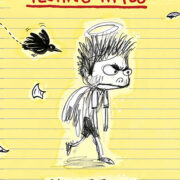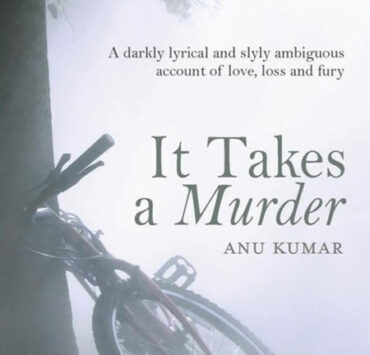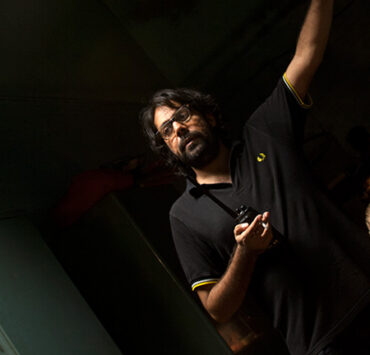Jai Arjun Singh is a New Delhi-based freelance writer and journalist. He has authored a monograph about the cult comedy film Jaane Bhi Do Yaaro and edited an anthology of film writing, titled The Popcorn Essayists: What Movies do to Writers.
He has written for Yahoo! India, Business Standard, The Hindu, The Caravan, Tehelka, and The Sunday Guardian, among other publications. He blogs at Jabberwock, where he writes mainly about literature and cinema. In this exclusive interview, he talks to us about life, the universe, and everything. Well, perhaps our conversation wasn’t all that comprehensive, but we will leave that for you to find out.
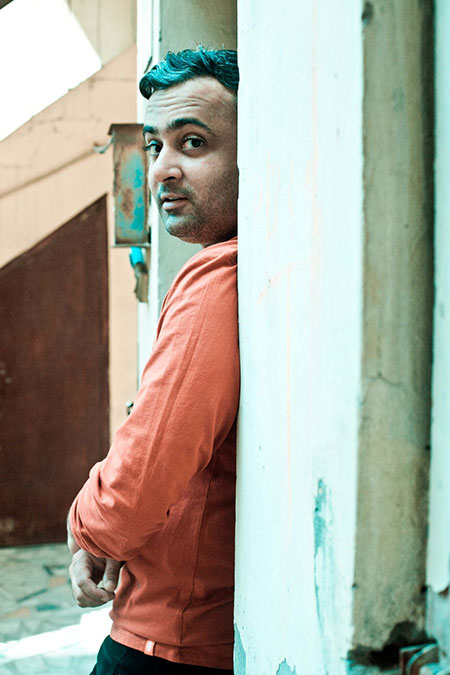
Jai Arjun Singh, a.k.a., The Jabberwock.
I would like to start with a rather silly question. On the Internet, you are almost as well known by your handle—Jabberwock—as your real name. Is there a story behind this ominous moniker? Or were you just out of usernames?
It has been so long ago now that I barely even remember what I was thinking at the time. But basically: (1) Lewis Carroll’s Jabberwocky is a favourite verse, and (2) without thinking too hard about it, I liked the idea of having a moniker that began with the same letters as my own name (and which, on reflection, happened to be phonetically similar to “Jai, be wacky”). One other option would have been Jabba the Hutt, and I’m very glad now that I didn’t go with that one!
In any case, I just chose the name quickly and started the blog, not imagining for a moment that it would ever develop a large-ish readership (if I had imagined that would happen, I would probably have agonised much more over the name).
It’s interesting to note that you never expected the blog to have a large following. How did a freelance career in writing come about? Did you freelance before starting Jabberwock or did writing for the blog somehow inspire you to do so?
The blog is what indirectly led to the freelancing. I had been working as a journalist for a few years before the blog happened—with the India Today Group and then with Business Standard—but it was once the blog developed a readership that things really started to happen for me. This was a time (2004-early 2005) when the Indian Internet space was less cluttered, there was no Facebook or Twitter, and blogs were getting noticed. To cut a long story short, after Jabberwock became popular, I got a few job offers from other publications. I was set to leave Business Standard to join another publication when they made me an offer I just couldn’t refuse: they said I could work from home, write for other publications while continuing to stay attached to them, and draw a regular monthly salary. It was the perfect scenario.
Before Jabberwock happened, were you primarily writing about films?
Not really. I had been writing notes about films just for myself since a very young age (maybe when I was 13-14) and as a professional journalist I had done a few film reviews for the India Today Group’s tabloid, Today, and for The Statesman. But when I started the blog (September 2004) I had been working for a year-and-a-half on the Business Standard Weekend, mainly doing dull corporate features that I had almost no personal interest in, as well as the occasional book review for the paper.
But even today, my principal beat is not cinema, in the sense that I haven’t worked as a regular weekly film reviewer anytime in the last eight or nine years.
I understand that you do not often write the run-of-the-mill weekly film review. But most of the posts on your blog (and I am guessing your freelance work?) deal with the subject of cinema. Apart from books, of course. Isn’t that so? Your piece on Dibakar Banerjee was featured as the cover story by The Caravan. Given the fact that you weren’t writing about films in a professional capacity before the blog took off and considering the keen insight that you provide in many of your articles, how did you make the leap from being an amateurish note-taker to a professional film critic? Does formal training help or do some people just have an eye for such things?
Formal training—through a film studies course or a film-criticism course—can certainly help in some ways (and perhaps hinder in some other ways). But in my view, the three most important qualities for being a professional film critic are (1) a genuine passion for cinema, preferably with an open-mindedness towards all types of films; which in turn would lead to (2) reading a lot about the subject—not necessarily through a formal course but through your own process of discovery, which is how it happened with me; and (3) having an interest in writing—in articulating your thoughts by setting them down on paper. (I know a few movie buffs who can talk endlessly and intelligently about films, but who have zero interest in writing about them.)
Also, I was sometimes writing about films professionally before the blog happened. But the blog gave me the opportunity to write about things without having to worry about word-length constraints (which I had to do while writing my Today and Statesman reviews). It got me into the practice of writing longer pieces and elaborating on my thoughts.
Moving away from the subject of films for a while: with the number of Internet users in India slowly beginning to rise, do you think it is a good time to cash in on the Internet phenomenon? Do you foresee a future where on one hand we have Internet celebrities, while on the other we have bloggers, entrepreneurs, etc. who make a living off the Internet, while catering to a population that is predominantly Indian? Your own journey seems to be a testimony to such a possibility, but I am guessing that you still depend on print publications for your bread and butter?
Difficult to answer this, because I have never earned any money directly from my blog—the advantages that have come to me have been indirect ones (such as the job offers and the increased recognition for my writing about literature and cinema). Also, I have been under the impression that it was easier for bloggers to cash in on the Internet phenomenon a few years ago than it is today: because there is much more online clutter now than there was 6-7 years ago (including, of course, social media). So it is probably harder for a new blogger—even a good writer—to get recognised and develop a following. I consider myself fortunate that I happened to start when I did.
But don’t take my word for it. These are just the impressions I have. Like I said, I know hardly anything about monetising one’s value on the internet.
I think there is not just more clutter around, but more quality as well. Several accomplished writers no longer treat the Internet as the abandoned child. At the same time, I have seen people go hoarse debating the pros and cons of working from home. How do you manage to get work done? Isn’t there a whole gamut of distractions to contend with?
Oh yes, there are many distractions, and at times it can get very difficult to shut everything out. I’m not as good a multi-tasker as I should be, and I often struggle a lot with my writing, so I need to be careful about not getting sucked into the worlds of Facebook and Twitter. This is one reason why I don’t use Twitter for conversations/interactions and use it only to flog my writings. (When I log in and see some of the long exchanges my writer-friends are having, I wonder how they manage to get any work done at all.)
In general, I wish I was a more efficient and disciplined writer, and that I agonised less about what I do. There have been times when I’m doing a book review and instead of just sitting down and getting it finished I write out a few stray, unstructured sentences, then fret a little and surf the net aimlessly (while leaving the Word file open)… and before I know it a few hours have passed and I’ve been sitting at the computer worrying about writing the review instead of just going ahead and writing it. Not a good habit when you’re a freelancer with multiple demands on your time!
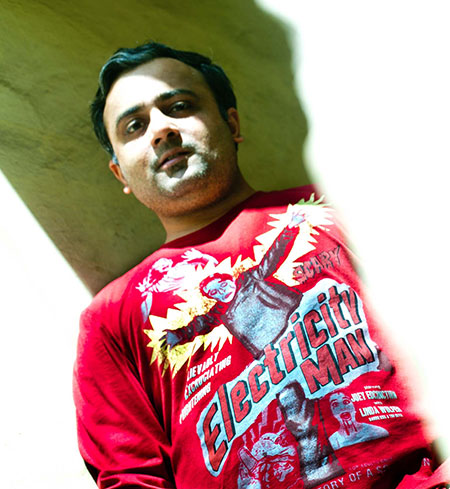
“I’ve always thought of myself as a tunnel-vision sort of a guy—mainly into cinema and literature and very little else.”
That almost reminds me of myself. And that is when I am often told what to do. But I must say it is certainly a surprise coming from a professional writer, and that too a freelancer. I had expected you to be strictly disciplined! Judging by the eclectic nature of your posts: Would you label yourself as a compulsive consumer of information? Or are you a slave to certain well-defined interests?
It’s flattering to hear “eclectic”, because I’ve always thought of myself as a tunnel-vision sort of a guy—mainly into cinema and literature and very little else. (I have almost no interest in politics, for example, and no interest in the corporate/business world, and I barely read the newspapers.) But of course, when one is reading a range of books and watching a variety of films, one automatically does end up engaging with many subjects. On the whole, I’d say I have become a keener “consumer of information” in recent years—which basically means I have expanded my range of interests. For instance, I developed an interest in popular-science books—especially evolutionary biology—in recent years (I was terrified of science in school), and have also been reading a lot about animal welfare.
Evolutionary biology always brings the name of Richard Dawkins to my mind. Going off on a tangent, in several of your posts you have made a mention of being an atheist. And Dawkins seems to be another favourite author of yours. Do you subscribe to his brand of militant atheism? Or are you the passive kind?
I’m unsure what these categories mean exactly, or if they should be used independent of context. I keep hearing from people that Dawkins is “militant” and “shrill”, but honestly if I were in his position—a public figure regularly being confronted with pea-brained young-earth creationists and other fundamentalists—I would be less polite than he is. And yet, I consider myself a fairly “passive” atheist on an everyday level. (I put up with family pujas without blowing a fuse, for example—though thankfully they don’t happen often! And some of the most important people in my life are believers.)
Does film criticism allow you to explore your literary ambitions? Or is it as more of a science than an art? In that regard, are there any writers who have influenced your own style?
Yes, of course, it helps me explore my literary ambitions (if one can use such a lofty term). Good criticism has to involve good, thoughtful writing, with all the rigour that goes into it—and all my own favourite critics are people whose writing I admire, and whose insights I learn from, irrespective of whether I share their assessment of a specific film.
Hard to speak in terms of “influences on style”, but a short list of film critics/writers I really admire would include: Jim Emerson, V. F. Perkins, Robin Wood, Danny Peary, Pauline Kael, and David Thomson. (Wood, Perkins, and Peary wrote books that served as some of my earliest introductions to high-quality film writing; the work of the others I discovered later.)
Would it be too presumptuous to expect a novel from the Jabberwock?
Oh no, I have no head for fiction-writing at all. And if I do end up doing another book—always a big if—it will almost certainly be cinema-related. (There is no so shortage of topics to write about—even 10 lifetimes wouldn’t be enough to do all the film-related writing I’d like to do. It’s a question of finding the time, energy, and motivation.) Literary ambitions can be realised just as much through criticism or through other types of non-fiction writing as they can through novels.
Lastly, and I know you will balk at this, but do you have any advisory for young writers, let’s say, your two cents?
The only meaningful advice I can think of is: read a lot, and read variedly and attentively. It might seem a very obvious thing to say, but I’m constantly surprised by how many young writers or wannabe writers there are these days who almost take pride in not reading much. In my view, to be a good writer you have to be a good reader first. And I might sound like a purist here, but I would think that’s a natural progression anyway: you become interested in reading at a relatively early age, grow into different sorts of reading, and then turn to writing because you have a love for written words, for the personal satisfaction and catharsis—or even empowerment—that comes with expressing yourself in this way.
But there are many people today who seem to jump into the world of writing just for the sake of it, without any background as readers—they seem to want to churn out novels simply because having one’s name on a book is perceived as something glamorous. And of course, they are overconfident—much more confident about themselves than they should be—precisely because they haven’t read enough to have high standards or a sense of what has already been accomplished in the world of literature.





